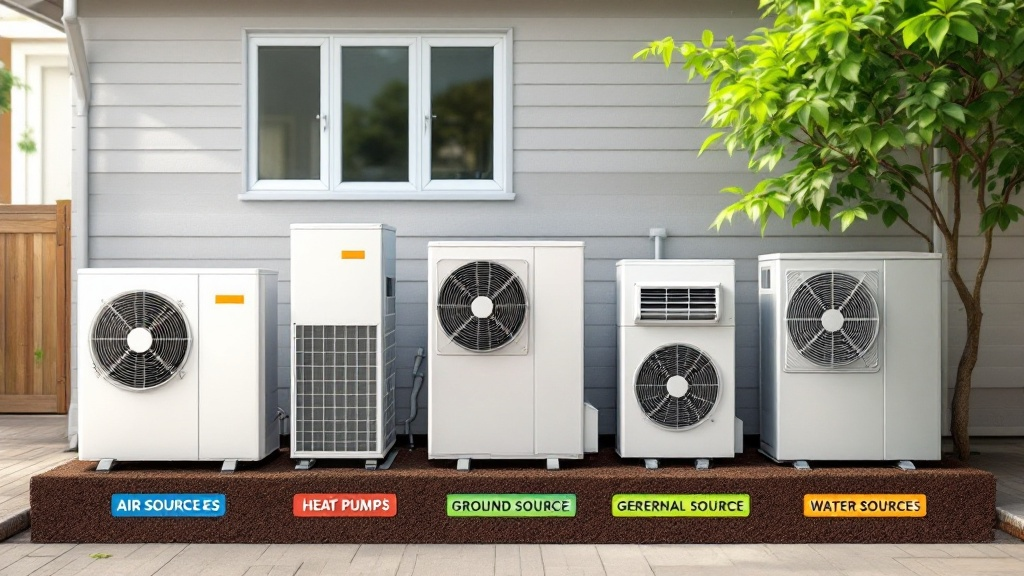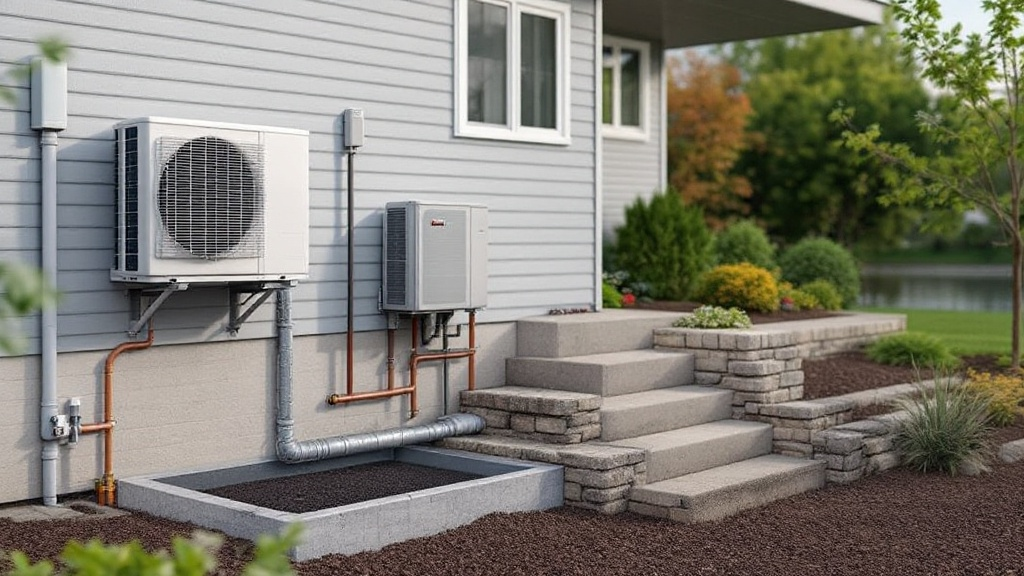When looking for ways to heat and cool your home, you will come across different types of heat pumps. Each type has its own benefits and works well in different situations. Knowing these types can help you choose the right one for your needs.
Key Takeaways
- Heat pumps are a smart choice for heating and cooling.
- There are several types, including air-source, ground-source, water-source, and ductless options.
- Each type works best in certain climates and situations.
- Proper heat pump maintenance is important to keep heat pumps running well.
- Choosing the right type can save you money on energy bills.
For more information on HVAC services, check out our maintenance plans for your heating and cooling systems.
What is a Heat Pump?

A heat pump moves heat from one place to another. In winter, it pulls heat from outside to warm your home. In summer, it does the opposite, moving heat from inside to cool your space. They are energy-efficient and can save you money on energy costs. Many homeowners in Fort Worth are turning to high-efficiency heat pumps for their energy-efficient heating needs.
Types of Heat Pumps

There are several kinds of heat pumps, and each has its own special features.
Air-Source Heat Pumps
Air-source heat pumps are very common. They pull heat from the air outside. This type works well in places like Fort Worth, where temperatures can vary. These air-source heat pumps are great for both heating and cooling your home. They are also known for their heat pump benefits, such as lower energy costs.
Ducted Air-Source Heat Pumps
These systems use ducts to move air around your house. They are great for homes that already have ductwork in place. You can enjoy even heating and cooling throughout your home with these air-source heat pumps. The heat pump installation process is straightforward if your home is already set up for it.
Ductless Air-Source Heat Pumps
Ductless systems, or mini-split heat pumps, do not need ducts. They have an indoor unit in each room that needs heating or cooling. This type is perfect for homes that do not have ductwork or for adding comfort to specific spaces. Ductless heat pumps are especially useful in older homes in Fort Worth. They also offer flexibility in heat pump costs since you can install them in stages.
Ground-Source (Geothermal) Heat Pumps
Ground-source heat pumps, also known as geothermal heat pumps, use the stable temperature of the ground. They can be very efficient but need more space for the underground loops. In a place like Fort Worth, these systems can work well because of the consistent ground temperature. Ground-source heat pumps are a great long-term investment and can qualify for heat pump rebates.
Water-Source Heat Pumps
Water-source heat pumps use water bodies like lakes or wells to transfer heat. They are less common but can be very effective in areas with access to water. If you have a pond or a well, this could be a good option for you. These systems can also be part of a renewable energy strategy for your home.
Absorption Heat Pumps
Absorption heat pumps use a heat source like natural gas or propane instead of electricity. They are less common but can be useful in certain situations, especially in larger buildings or industrial spaces.
Hybrid Heat Pumps
Hybrid systems combine two types of heating. They usually have a heat pump and a backup system like a gas furnace. This allows you to switch between systems based on what is more efficient at the time. Hybrid heat pumps are great for varying climates and can help you save on heat pump costs.
Cold Climate Heat Pumps
Cold climate heat pumps are designed to work in very low temperatures. They have special features to ensure they can still pull heat from the air when it is really cold outside. This is important for areas in Texas that can have chilly winters. These reversible heat pumps can switch between heating and cooling modes efficiently, making them a smart choice for energy-efficient heating.
| Type of Heat Pump | Ideal Climate | Installation Cost | Energy Efficiency Rating |
|---|---|---|---|
| Air-Source Heat Pump | Moderate to Mild | Moderate | High |
| Ground-Source Heat Pump | Varies, depending on soil | High | Very High |
| Ductless Air-Source | Any, especially older homes | Moderate to High | High |
Advanced Technologies in Heat Pumps

Today, heat pumps come with new technology to make them even better.
Variable-Speed Compressors
These compressors adjust their speed based on how much heating or cooling is needed. They can save energy and keep your home more comfortable by making less noise and reducing temperature swings. This feature is often found in high-efficiency heat pumps.
Dual-Fuel Systems
These systems switch between a heat pump and a furnace. They use the heat pump when it’s not too cold and switch to the furnace during really cold weather. This gives you more comfort and efficiency.
Desuperheaters
Desuperheaters capture extra heat from the heat pump. This heat can be used to heat water. It’s a smart way to use energy that would otherwise go to waste, contributing to your overall energy-efficient heating strategy.
Why Choose a Heat Pump?
Energy Efficiency
Heat pumps use less energy than traditional systems like furnaces or air conditioners. They can reduce energy bills and are better for the environment. Many homeowners in Fort Worth appreciate the heat pump benefits that come with lower energy consumption.
Comfort
Heat pumps provide consistent temperatures. Unlike some heaters that can make the air dry, heat pumps do not. This makes your home feel comfortable year-round.
Low Maintenance
Heat pumps do not have many moving parts. This means they require less maintenance than other heating and cooling systems. Regular heat pump maintenance can keep them running smoothly and efficiently.
Space-Saving Options
Ductless heat pumps are perfect for homes without ductwork. They take up less space and can be installed in areas where traditional systems won’t fit. This can help you save on both installation and heat pump costs.
- Consider Your Home’s Layout: Think about how your home is structured. This will influence whether a ducted or ductless system is more appropriate.
- Evaluate Your Energy Needs: Assess whether you require a system that provides both heating and cooling.
- Climate Considerations: Take into account your local climate and how extreme temperatures might impact your choice.
- Budget for Installation and Maintenance: Factor in both the initial heat pump installation cost and ongoing maintenance expenses.
Finding a Trusted HVAC Partner
When selecting a heat pump, working with a trusted HVAC company is vital. They will help you choose the right system based on your needs and the layout of your home.
For more information on how to effectively heat your home, check out our page on heater installation services.
Why Choose Prestige Air?
At Prestige Air, we specialize in HVAC services in Fort Worth. Our expert team can help you select and install the right heat pump for your home.
- Expert Advice: Our trained technicians know heat pumps inside and out. They can guide you through the options.
- Quality Service: We offer reliable service and maintenance plans. You can trust us to keep your system running well.
- Local Knowledge: Being a local business, we understand the climate and needs of Fort Worth homeowners.
| Feature | Air-Source Heat Pump | Ground-Source Heat Pump | Ductless Air-Source |
|---|---|---|---|
| Average Lifespan | 15-20 years | 25-30 years | 15-20 years |
| Noise Level | Moderate | Low | Low |
| Efficiency in Extreme Cold | Moderate | High | High |
| Installation Complexity | Moderate | High | Low |
Conclusion
Heat pumps are an efficient way to keep your home comfortable. With options like air-source, ground-source, and ductless systems, there is a type of heat pump for everyone. Understanding the types of heat pumps and how they work will help you make a better choice.
Whether you want to save on energy bills or improve your home’s comfort, a heat pump could be the perfect fit for you. Contact Prestige Air today to learn more about how we can help you choose the right heat pump for your home in Fort Worth, Texas.
Get Started Today
Are you ready to explore your heating and cooling options? Don’t wait any longer! Reach out to Prestige Air for expert advice and service. You can call us at (817) 200-7215 or visit our website to schedule an appointment. Your comfort is our priority!